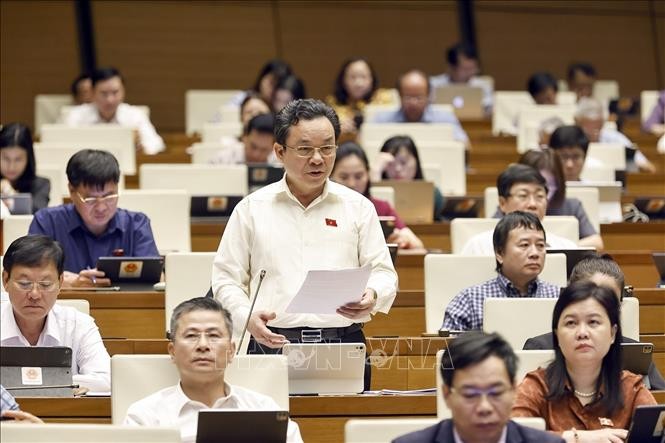
On the sidelines of the 9th Session of the 15th National Assembly , speaking with a reporter from the Vietnam News Agency on the morning of May 12, delegate Hoang Van Cuong (Hanoi delegation) said: To be more fair and effective, it is necessary to switch to taxing the difference between the purchase price and the selling price like in developed countries to combat speculation and collect the correct portion of land tax created by the State and society.
Sir, public opinion is currently interested in the proposal of the Ministry of Finance to tax the difference between the purchase price and the sale price in real estate transactions instead of a fixed 2% tax on the sale price. What is your assessment of this proposal?
The shift from a fixed tax of 2% to a tax on the difference in the purchase and sale price of 20% as proposed by the Ministry of Finance is, in my opinion, an important step forward in real estate tax policy. This option is fair and reasonable because there are many cases where people have just bought a piece of land at a very low price, but then the State planned to open a road next to it or planned to develop nearby projects, causing the land price to increase many times. So that difference is clearly the added value thanks to the investment of the State and society, not created by individual efforts. Collecting this tax will help the State recover a part of the land tax difference to reinvest in other infrastructure projects.
So what are the advantages of the differential tax scheme, sir?
The biggest advantage is to create fairness among subjects. Speculators who buy land and then leave it there without developing anything, just waiting for the price to increase to sell will have to pay high taxes. Meanwhile, those who actually invest, such as building, renovating, and developing land, will have their costs deducted and pay reasonable taxes. For example, in Korea, if real estate is sold within 1 year, the income tax can be up to 60%. But if the land is kept and invested in for effective use, the tax will be significantly reduced and this is a policy to limit speculation and encourage effective land use.
But currently, the declaration of real estate prices is still not transparent, there are even cases of under-declaration. So, according to the delegates, how can we collect taxes on the difference accurately?
In fact, many transactions still declare purchase and sale prices lower than actual prices to avoid taxes. Therefore, if we want to apply taxes on the difference, we need to have an accurate, objective and regularly updated land valuation data system. At the same time, we need to promote digital transformation in land and public asset management.
Currently, developed countries have done this very well and real estate data is centrally managed. All transactions must be declared transparently, market values are continuously updated and can be compared and contrasted.
Some people say that land price management still depends on the price framework of the provinces and is not close to reality. Will this affect tax policy, sir?
Land price management still depends heavily on local price lists. Although the new Land Law requires price lists to approach market prices, implementation is still limited. If the land price announced by localities is lower than the market price, even if taxes are levied on the difference, it will not be enough to collect. Therefore, for tax policy to be effective, a transparent and synchronous market-based land pricing system is needed between the central and local governments.
In that context, how do you evaluate the role of digital transformation in tax and land management reform?
Digital transformation plays a key role. When the entire real estate transaction is digitized, connected to population data, finance, banking and tax authorities, it will be very difficult to commit fraud. For example, a person buys land, the information is saved in the system and then resells it, the system also records the selling price. If the difference is large, the tax is automatically calculated. This is the direction that many countries are implementing and Vietnam also needs to speed up this process to manage effectively, prevent revenue loss and create fairness.
There are concerns that high taxes on real estate buyers and sellers will reduce market liquidity. What is your opinion on this?
It is true that tax policy affects market behavior. But it is important to understand that tax policy is not intended to “tighten” the market but to regulate speculative behavior, hoarding land without using it, and distorting the market. If people use land for the right purpose and invest in development, they will not be subject to high taxes. Only cases of speculation, hoarding goods, and waiting for prices to increase will be heavily taxed. This is a way to promote the real estate market to develop more healthily and sustainably.
Thank you very much!
Source: https://baolaocai.vn/danh-thue-bat-dong-san-theo-chenh-lech-gia-de-chong-dau-co-post401661.html


































































































Comment (0)